Key takeaways:
- Personal biases shape our understanding of complex issues, highlighting the need for self-reflection and awareness.
- Engaging with diverse perspectives enriches our understanding and challenges long-held beliefs, fostering empathy.
- The anti-death penalty movement underscores the inherent value of life and the irreversible nature of capital punishment.
- Advocating against bias involves educating oneself, embracing vulnerability in discussions, and sharing personal reflections to promote collective understanding.
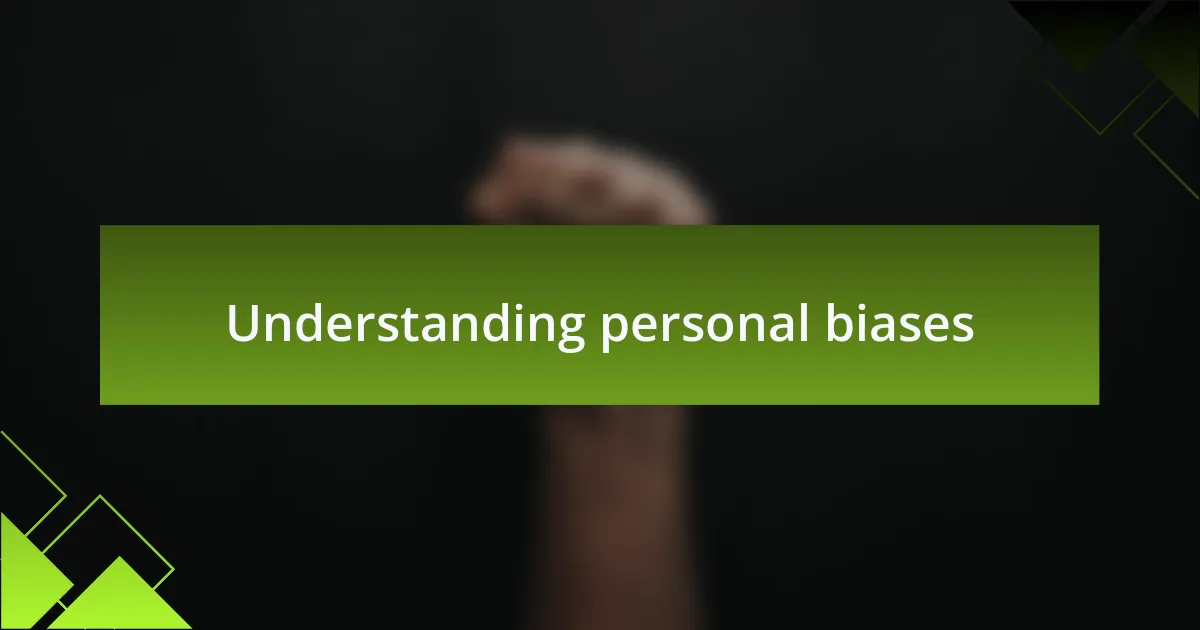
Understanding personal biases
Understanding personal biases can be a bit like looking in a funhouse mirror; what we see isn’t always the full picture. I remember a time when I assumed every individual on death row was guilty based purely on media portrayals. It took deep reflection and research to realize that my perceptions were clouded by sensationalized narratives, and I began to see the flawed justice system differently.
Have you ever considered how your upbringing influences your views? I grew up in a community where the death penalty was a widely accepted form of justice, and it wasn’t until I engaged with dissenting perspectives that I recognized how my environment shaped my biases. It’s a humbling experience to confront these ingrained beliefs, and it makes me wonder how many others might be affected by their surroundings in similar ways.
Moreover, personal biases can often go unnoticed, lurking beneath the surface of our consciousness. I found myself grappling with discomfort when discussing the moral implications of the death penalty with friends. Their passionate arguments triggered my defensiveness, prompting me to ask: What essence of my beliefs feels threatened? Beyond merely understanding biases, it’s essential we challenge them to foster meaningful dialogue.
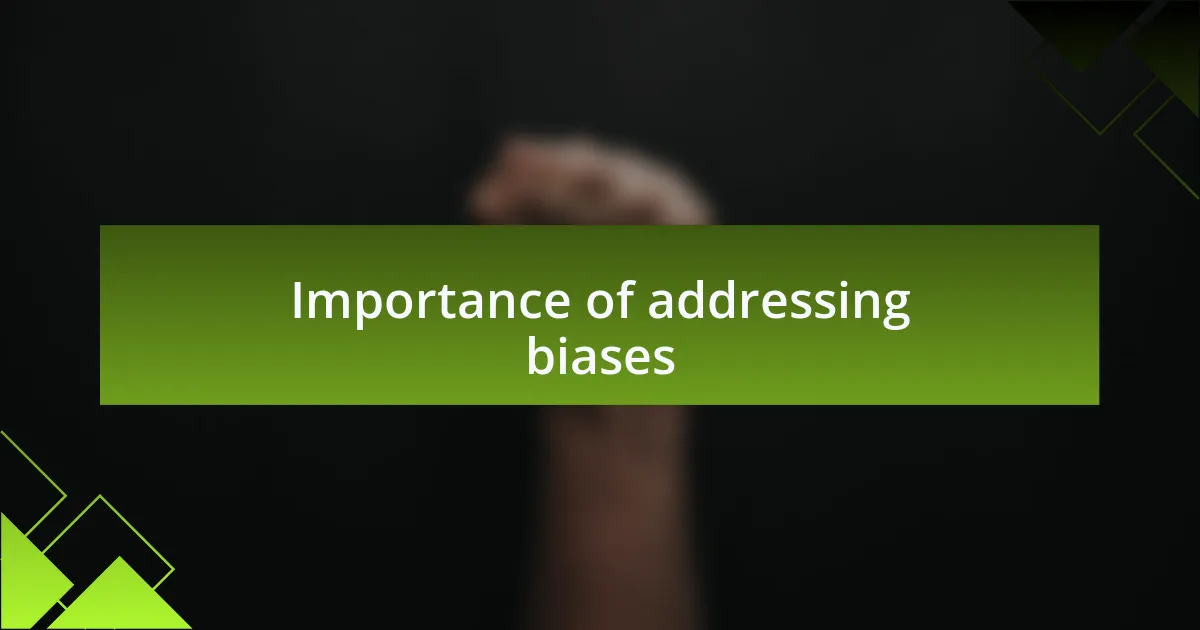
Importance of addressing biases
Addressing biases is crucial in creating a fair dialogue, especially when discussing sensitive topics like the death penalty. I once attended a seminar that challenged my preconceived notions, and I realized how much our biases can distort the reality of a situation. It was an eye-opening experience; I had to confront my own assumptions and understand the diverse factors that contribute to the debate.
Biases can subtly influence how we interpret information, leading us to reinforce our existing beliefs rather than question them. There was a moment during a heated discussion with a colleague when I caught myself dismissing their points simply because they contradicted my views. It struck me that this tendency to disregard opposing arguments can limit our ability to engage meaningfully. How many insights might we miss by clinging to our biases?
Recognizing and addressing biases not only enhances our understanding but also nurtures empathy. I remember reading a story about a wrongfully convicted person who spent years on death row. Their experience challenged my earlier beliefs and helped me empathize with the flawed systems at play. If we remain unaware of our biases, how can we truly advocate for justice and reform? Engaging with diverse perspectives lays the groundwork for a more holistic view, allowing us to advocate for change constructively.
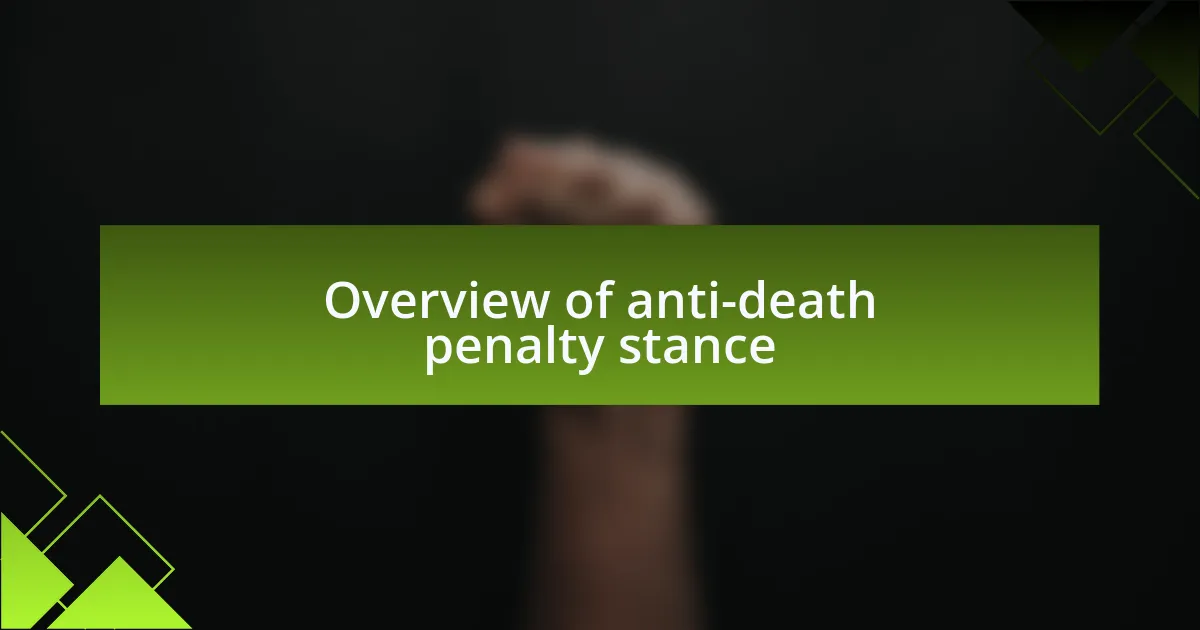
Overview of anti-death penalty stance
The anti-death penalty movement is firmly grounded in the belief that every life holds intrinsic value, regardless of one’s actions. I remember the moment I first encountered the story of a man exonerated after decades on death row; it left me questioning the very foundation of capital punishment. How can we justify a system that has the potential to execute the innocent?
Many advocates emphasize the irreversible nature of the death penalty, pointing out its chilling finality. Reflecting on this, I recalled a time when I engaged with a friend who had supported the death penalty; they became visibly shaken upon hearing statistics about wrongful convictions. It was a pivotal moment that illustrated how knowledge can challenge long-held beliefs.
Moreover, the inconsistency of how justice is served across different demographics adds another layer to this complex issue. I often think about the disparities in sentencing—the fact that wealth and race can influence who receives the death penalty. Isn’t it troubling to consider how biases within the system lead to unequal outcomes? Understanding these stark realities compels us to advocate for a more equitable approach to justice.
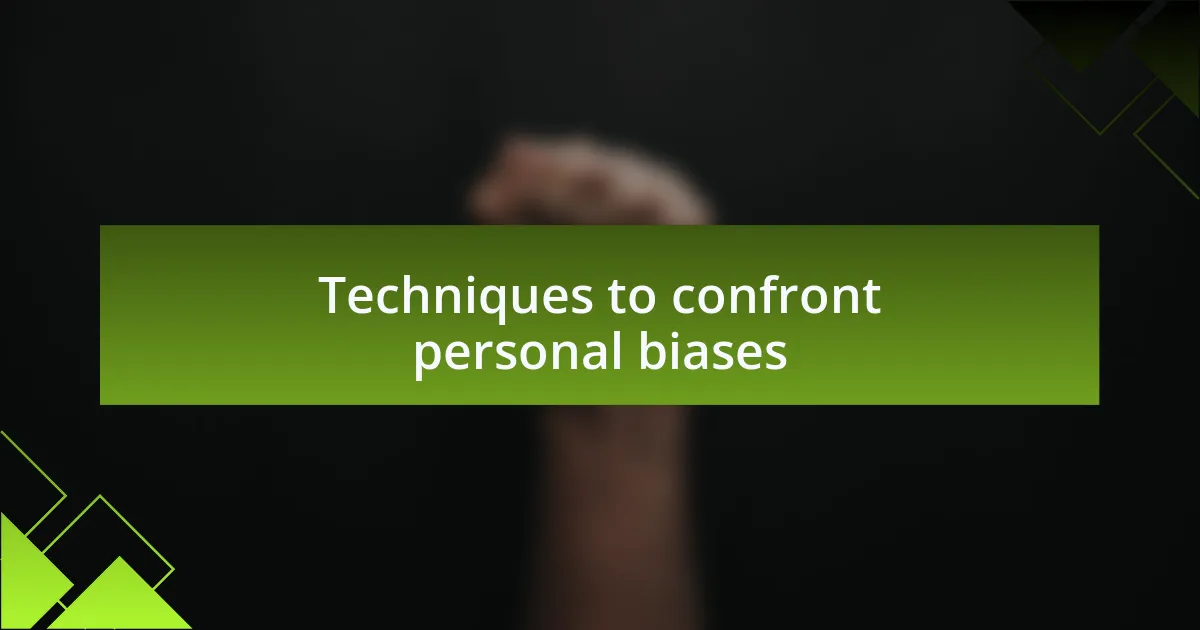
Techniques to confront personal biases
To confront personal biases, one effective technique is engaging in self-reflection. I remember when I first realized my own biases while discussing justice with friends. It was uncomfortable to recognize that my opinions were shaped by my background and experiences, but this awareness allowed me to question my assumptions.
Another valuable practice is to actively seek out diverse perspectives. I once joined a community group that included people from various walks of life. Listening to their stories and experiences opened my eyes to the nuances of the death penalty debate in ways I had never considered. Have you ever thought about how different backgrounds can color our understanding of justice?
Finally, it’s crucial to educate oneself continuously. Regularly reading literature, attending workshops, or engaging in discussions centered around social justice themes can facilitate a more balanced viewpoint. There’s a world of knowledge out there waiting for us; I often find that learning from experts and those impacted by the system challenges my previous beliefs and inspires me to advocate for change.
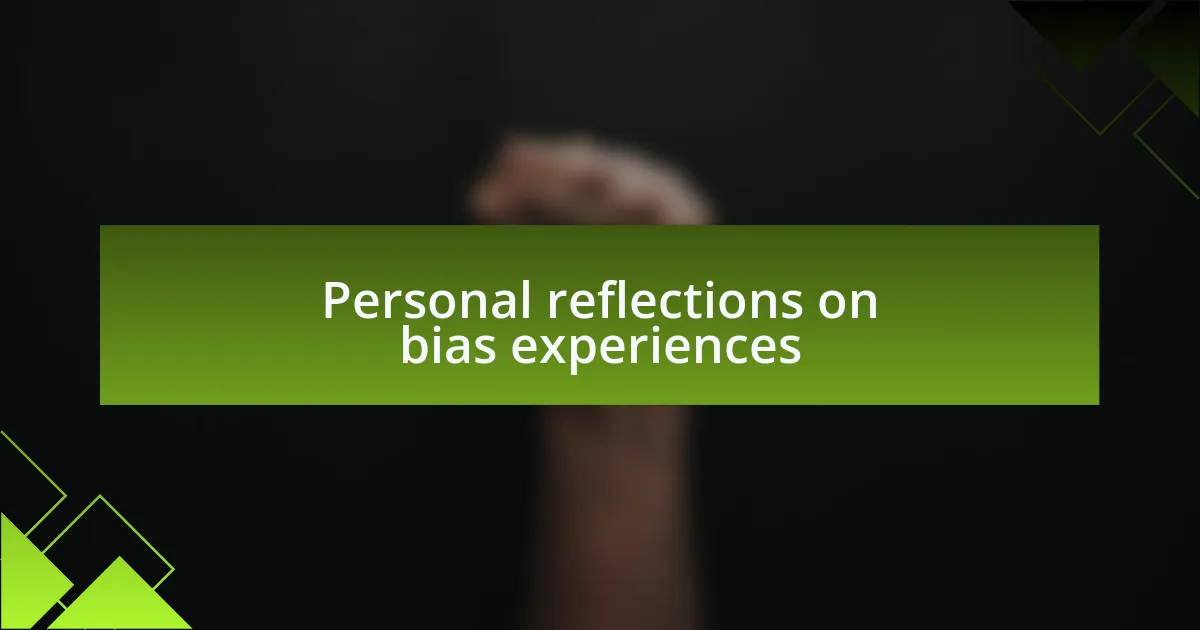
Personal reflections on bias experiences
Reflecting on my biases brings a wave of mixed emotions. I recall a specific moment during a heated debate about the death penalty when a friend shared their personal story of losing a loved one to violent crime. My immediate reaction was defensive; I felt my perspective being challenged. It was a pivotal moment, prompting me to sit in silence and consider how my hasty conclusions could overshadow someone else’s profound pain.
At another point, I began journaling to explore my thoughts around justice and punishment. This practice unearthed feelings I hadn’t fully acknowledged, revealing how my upbringing shaped my views. I realized it isn’t just about right or wrong; it’s about the complex human experiences beneath the surface. Have you ever taken the time to write down your feelings about a controversial topic? It can be surprisingly enlightening.
I’ve also noticed how my emotional responses vary depending on the context of discussions. Engaging with individuals who have been directly affected by the criminal justice system often leaves me both inspired and troubled. In those moments, I question: how can I incorporate their realities into my understanding of justice? These reflections evoke empathy and push me to confront my biases more vigorously, knowing that every story adds depth to my perspective.
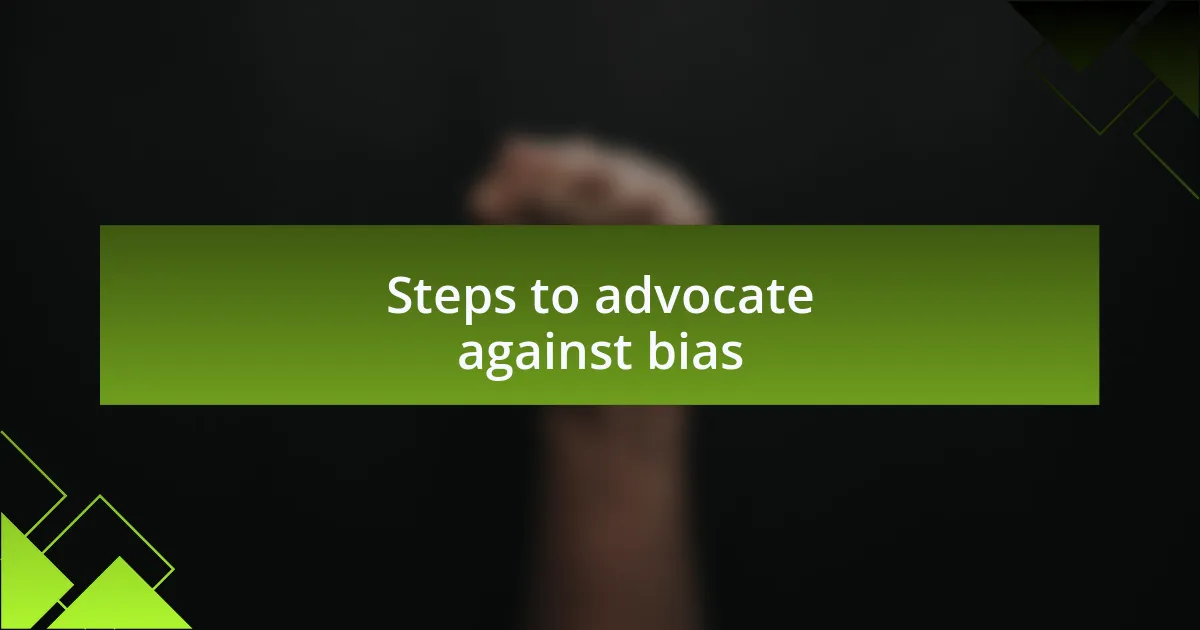
Steps to advocate against bias
To advocate against bias, the first step I took was to educate myself on the experiences of those directly impacted by the death penalty. Attending community forums and listening to exonerated individuals share their stories opened my eyes to the complexities of this issue. Have you ever found yourself in a space where the raw emotions of others transformed your understanding? It’s a humbling experience that fosters empathy.
Next, I learned to challenge my own assumptions by actively seeking out diverse perspectives. For instance, during discussions with friends who hold opposing views, I practice asking open-ended questions. This not only deepens our conversations but also helps me reflect on why I feel the way I do. How often do we allow ourselves to be vulnerable in conversations? Embracing that vulnerability can lead to authentic dialogue and personal growth.
Finally, I realized the importance of sharing my journey with others, which creates a ripple effect. By writing blog posts about my reflections and insights, I foster a space for collective discussion. Have you considered how sharing your inner journey can encourage others to confront their biases too? It’s powerful to realize that vulnerability can lead to communal learning and transformation in the way we view complex issues like capital punishment.